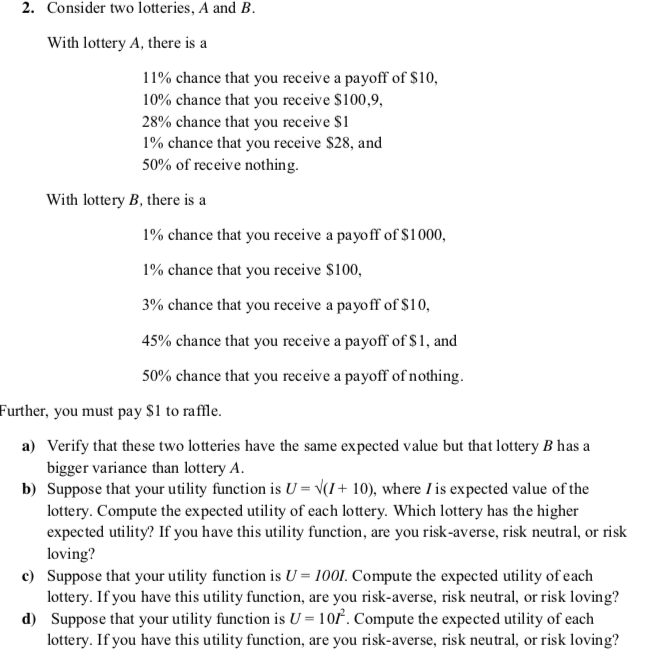a) Verify that these two lotteries have the same expected value but that lottery B has a bigger variance than lottery A. b) Suppose that your utility function is U = √(I+ 10), where I is expected value of the lottery. Compute the expected utility of each lottery. Which lottery has the higher expected utility? If you have this utility function, are you risk-averse, risk neutral, or risk loving? c) Suppose that your utility function is U = 1001. Compute the expected utility of each lottery. If you have this utility function, are you risk-averse, risk neutral, or risk loving? d) Suppose that your utility function is U = 10P. Compute the expected utility of each lottery. If you have this utility function, are you risk-averse, risk neutral, or risk loving?
a) Verify that these two lotteries have the same expected value but that lottery B has a bigger variance than lottery A. b) Suppose that your utility function is U = √(I+ 10), where I is expected value of the lottery. Compute the expected utility of each lottery. Which lottery has the higher expected utility? If you have this utility function, are you risk-averse, risk neutral, or risk loving? c) Suppose that your utility function is U = 1001. Compute the expected utility of each lottery. If you have this utility function, are you risk-averse, risk neutral, or risk loving? d) Suppose that your utility function is U = 10P. Compute the expected utility of each lottery. If you have this utility function, are you risk-averse, risk neutral, or risk loving?
Linear Algebra: A Modern Introduction
4th Edition
ISBN:9781285463247
Author:David Poole
Publisher:David Poole
Chapter2: Systems Of Linear Equations
Section2.4: Applications
Problem 26EQ
Related questions
Question
Dear tutor, please solve the all part of the question as very clear and detailed. THANK YOU SO MUCH!!!

Transcribed Image Text:2. Consider two lotteries, A and B.
With lottery A, there is a
11% chance that you receive a payoff of $10,
10% chance that you receive $100,9,
28% chance that you receive $1
1% chance that you receive $28, and
50% of receive nothing.
With lottery B, there is a
1% chance that you receive a payoff of $1000,
1% chance that you receive $100,
3% chance that you receive a payoff of S10,
45% chance that you receive a payoff of $1, and
50% chance that you receive a payoff of nothing.
Further, you must pay $1 to raffle.
a) Verify that these two lotteries have the same expected value but that lottery B has a
bigger variance than lottery A.
b) Suppose that your utility function is U = v(1 + 10), where I is expected value of the
lottery. Compute the expected utility of each lottery. Which lottery has the higher
expected utility? If you have this utility function, are you risk-averse, risk neutral, or risk
loving?
c) Suppose that your utility function is U = 1001. Compute the expected utility of each
lottery. If you have this utility function, are you risk-averse, risk neutral, or risk loving?
d) Suppose that your utility function is U = 10/". Compute the expected utility of each
lottery. If you have this utility function, are you risk-averse, risk neutral, or risk loving?
Expert Solution
This question has been solved!
Explore an expertly crafted, step-by-step solution for a thorough understanding of key concepts.
Step by step
Solved in 5 steps

Knowledge Booster
Learn more about
Need a deep-dive on the concept behind this application? Look no further. Learn more about this topic, statistics and related others by exploring similar questions and additional content below.Recommended textbooks for you

Linear Algebra: A Modern Introduction
Algebra
ISBN:
9781285463247
Author:
David Poole
Publisher:
Cengage Learning

Glencoe Algebra 1, Student Edition, 9780079039897…
Algebra
ISBN:
9780079039897
Author:
Carter
Publisher:
McGraw Hill

Linear Algebra: A Modern Introduction
Algebra
ISBN:
9781285463247
Author:
David Poole
Publisher:
Cengage Learning

Glencoe Algebra 1, Student Edition, 9780079039897…
Algebra
ISBN:
9780079039897
Author:
Carter
Publisher:
McGraw Hill